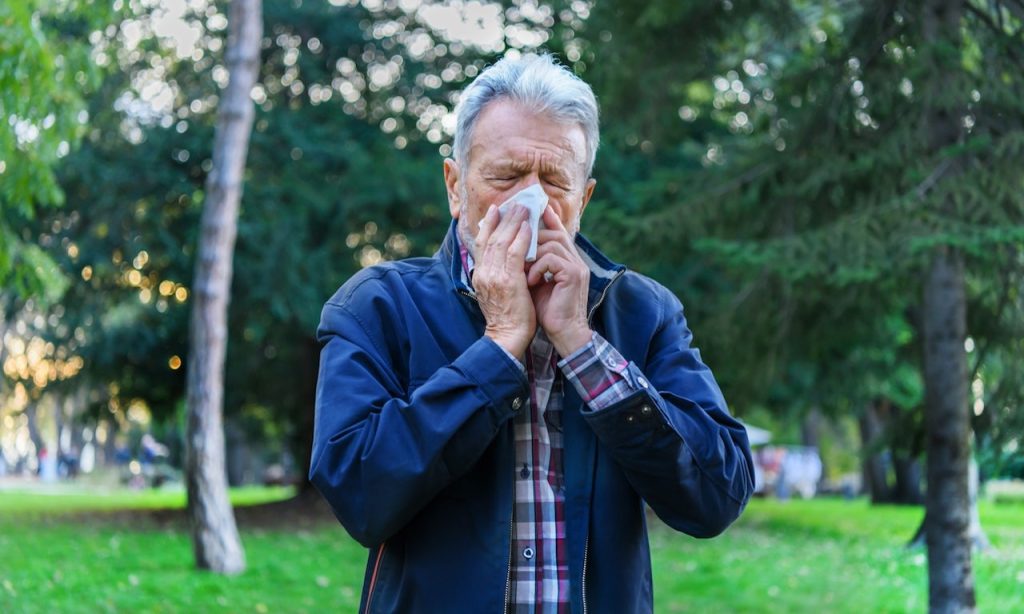As allergy season approaches, many are bracing for a difficult time, compounded by rapidly changing climate conditions. According to experts, fluctuations in temperature and precipitation patterns are allowing plants and trees to bloom in areas where they previously did not, leading to an increase in pollen counts and the emergence of new pollen types. The Asthma and Allergy Foundation of America (AAFA) has released a report identifying the top cities in the U.S. that pose the greatest challenges for allergy sufferers. Among these, Wichita, Kansas, stands out as the worst, topping the list for the third consecutive year.
| Article Subheadings |
|---|
| 1) Factors Contributing to Increased Allergies |
| 2) The Most Challenging Cities for Allergy Sufferers |
| 3) Expert Recommendations for Managing Allergies |
| 4) Symptoms to Watch for This Allergy Season |
| 5) Conclusion and Ongoing Concerns |
Factors Contributing to Increased Allergies
The increase in seasonal allergies is attributed to a multitude of factors that have been exacerbated by climate change. The American Lung Association highlights that variations in climate conditions are enabling plants and trees to grow in previously inhospitable areas. This shift has resulted in heightened pollen counts across various regions, introducing new pollen types that can trigger allergic reactions, even in individuals who have never before experienced allergies. A recent increase in the production of tree, grass, and weed pollen is creating a perfect storm for allergy sufferers, leading experts to warn of a particularly intense allergy season.
The Most Challenging Cities for Allergy Sufferers
The AAFA’s latest report on allergies identifies the most challenging cities for those affected by seasonal allergies. Wichita, Kansas, has once again claimed the top spot, marking its third consecutive year as the “allergy capital” of the U.S. This classification is largely due to its above-average tree and grass pollen levels, which significantly impact local residents. Following Wichita, New Orleans, Louisiana; Oklahoma City, and Tulsa in Oklahoma; and Memphis, Tennessee, round out the top five cities for allergy sufferers. Each of these locations presents unique allergenic challenges based on their geographical and climatic characteristics.
Expert Recommendations for Managing Allergies
Managing allergies effectively requires proactive measures, according to Dr. Purvi Parikh, a specialist in infectious disease, allergy, and immunology. She emphasizes the importance of beginning medication regimens early, recommending the use of 24-hour antihistamines for their extended relief capabilities. Eye drops and antihistamine nasal sprays can also provide effective relief from itchy eyes and nasal congestion. Dr. Parikh further notes that individuals experiencing respiratory symptoms such as coughing or wheezing should consult a medical professional, as these can be indicators of asthma rather than simple allergies.
In addition to medication, Dr. Parikh advises making a few lifestyle modifications. Washing clothes and taking showers after spending time outdoors can help remove pollen and decrease exposure. It’s also crucial to limit outdoor activity during peak pollen times, particularly early in the day when counts are highest. Keeping windows closed during these times can significantly reduce indoor pollen levels, providing additional relief from symptoms.
Symptoms to Watch for This Allergy Season
Seasonal allergies can produce a variety of symptoms that often overlap with cold and flu symptoms. Common manifestations include runny or stuffy noses, itchy eyes, sneezing, and general fatigue. However, distinguishing between allergies and illnesses is crucial for effective management. Dr. Parikh points out that while colds tend to resolve within a week or two, allergy symptoms can persist for an extended period, particularly during peak pollen months in spring. Individuals who experience prolonged symptoms should consult healthcare providers to determine whether they’re dealing with allergies or another condition.
Conclusion and Ongoing Concerns
As the allergy season intensifies, particularly in cities like Wichita, the health implications for millions of allergy sufferers become more significant. The rising pollen levels represent not just a seasonal nuisance but also a growing public health concern influenced by broader climate conditions. Increased awareness and effective management strategies can help mitigate the impact of allergies on individual health and quality of life. Ongoing research into the links between climate change, environmental factors, and allergies will be critical in addressing these challenges moving forward.
| No. | Key Points |
|---|---|
| 1 | Climate change is increasing pollen counts and extending allergy seasons. |
| 2 | Wichita, Kansas, is identified as the worst city for allergies for the third consecutive year. |
| 3 | Proactive measures, including early medication and lifestyle changes, are essential for managing allergies. |
| 4 | Symptoms of allergies can overlap with other illnesses; distinguishing between the two is crucial. |
| 5 | Ongoing public health research is vital to address allergic responses linked to climate change. |
Summary
In conclusion, the rising toll of allergies underscores the profound influence of climate change on public health. As cities like Wichita face increasing challenges from pollen, proactive management and awareness become imperative for those affected. Understanding both the environmental drivers and the clinical approaches to dealing with allergies will be essential in navigating future allergy seasons effectively.
Frequently Asked Questions
Question: What are the most common symptoms of seasonal allergies?
Common symptoms include itchy eyes, sneezing, runny or stuffy noses, and fatigue. These symptoms can resemble those of a cold, but they tend to last longer and occur during specific seasons.
Question: How can I effectively manage seasonal allergies?
Effective management includes starting antihistamine medications early, changing clothes after outdoor activities, and minimizing exposure during high pollen times.
Question: What should I do if I can’t determine whether my symptoms are due to allergies or a cold?
If you experience prolonged symptoms or are unsure if they’re related to allergies, it’s advisable to consult a healthcare provider for accurate diagnosis and treatment options.
